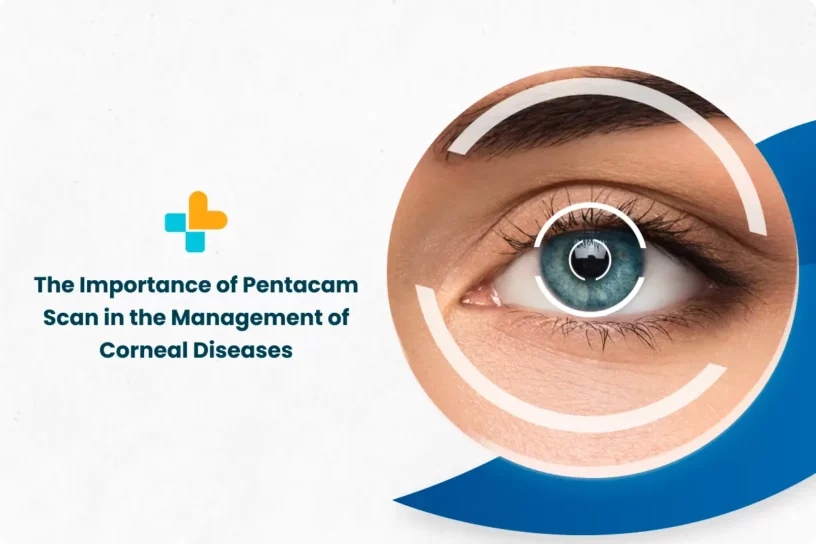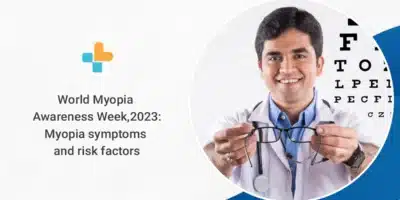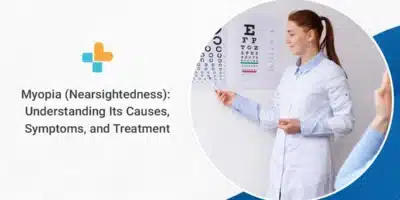Do you struggle with finding your glasses in the morning or waking up with dry, uncomfortable contacts? Or do you experience trouble seeing at night due to glare? Don’t let daily vision problems hold you back. It can happen due to corneal diseases.
If you’re experiencing issues with your cornea, it’s important to get it checked with a Pentacam scan to accurately diagnose any potential diseases.
What is Cornea?
The cornea is the transparent outer layer of the eye that covers the iris and the pupil. It is responsible for refracting and focusing light as it enters the eye. As cornea lacks blood vessels and nerves and receives oxygen and nutrients from tears and aqueous humor. Its healing process depends on healthy corneal cell migration as it cannot transport immune cells. Extensive damage may result in a permanent scar due to limited regeneration ability, so taking precautions to protect the eyes and seeking medical attention is crucial in case of injury.
What is Pentacam technology?
The Pentacam scan is a non-invasive imaging test that uses rotating Scheimpflug technology to create a three-dimensional image of the cornea. The scan provides detailed information about the shape and thickness of the cornea, which is essential in diagnosing and managing corneal diseases.
Corneal diseases affect millions of people worldwide, and early detection and diagnosis are critical to preserving vision. The Pentacam scan is a valuable tool in the management of corneal diseases, as it allows for early detection and monitoring of changes in the cornea.
What are some of the Corneal Diseases Detected by Pentacam Scan?
One of the most common corneal diseases is keratoconus. Keratoconus is a progressive condition that causes thinning and bulging of the cornea, leading to distorted vision. The Pentacam scan can detect the early stages of keratoconus, allowing for prompt treatment and management to prevent further progression.
It affects about 1 in 2000 people worldwide, with a higher prevalence in certain populations, such as South Asians, where the incidence is estimated to be 2.3%. In India, it’s estimated that 1 in 500 individuals has keratoconus. Early diagnosis and treatment can slow the progression of the disease and improve visual outcomes, highlighting the importance of regular eye exams.
Another corneal disease that can be detected with a Pentacam scan is Fuchs’ endothelial dystrophy. Fuchs’ endothelial dystrophy is a condition that affects the innermost layer of the cornea, leading to swelling and clouding of the cornea. The Pentacam scan can detect changes in corneal thickness, which can indicate the presence of Fuchs’ endothelial dystrophy.
The Pentacam scan is also useful in the management of corneal ectasia, which is a condition that can occur after refractive surgery such as LASIK. Corneal ectasia is characterised by a thinning and bulging of the cornea, leading to distorted vision. The Pentacam scan can detect changes in corneal thickness, which can indicate the presence of corneal ectasia.
The exact prevalence of corneal ectasia is not well established, but it is estimated to affect approximately 1 in 2000 individuals worldwide. In India, the prevalence of corneal ectasia is reported to be 0.28%, which is lower than the global average.
What is the scope of Pentacam Scan in India?
In India, corneal diseases are prevalent, with over 2 million people affected by corneal blindness. The majority of corneal blindness cases in India are due to infections such as keratitis and corneal injuries. The Pentacam scan is a valuable tool for the management of corneal diseases in India, allowing for early detection and diagnosis of corneal diseases, and providing better outcomes for patients.
The Pentacam scan is a safe and non-invasive test that can provide valuable information about the cornea, allowing for early detection and diagnosis of corneal diseases. The test takes only a few minutes to perform and is painless.
Conclusion
In conclusion, the Pentacam scan is a valuable tool in the management of corneal diseases. It allows for early detection and monitoring of changes in the cornea, which is essential in preserving vision. In India, where corneal diseases are prevalent, the Pentacam scan is becoming increasingly important in the diagnosis and management of corneal diseases, providing better outcomes for patients. If you are experiencing any symptoms of corneal disease, such as blurred or distorted vision, contact an ophthalmologist at Ayu Health and ask about the Pentacam scan. You can also dial 636-610-0800 to know more.
Our Hospital Locations
Ophthalmology Surgery Hospitals in Chandigarh | Ophthalmology Surgery Hospitals in Bangalore | Ophthalmology Surgery Hospitals in Jaipur | Ophthalmology Surgery Hospitals in NCR | Ophthalmology Surgery Hospitals in Hyderabad
Our Doctors
Ophthalmology Surgery Doctors in Chandigarh | Ophthalmology Surgery Doctors in Bangalore | Ophthalmology Surgery Doctors in Jaipur | Ophthalmology Surgery Doctors in NCR | Ophthalmology Surgery Doctors in Hyderabad
About the Author

Dr. S. Goel
Dr. S. Goel is a renowned Internal Medicine Specialist currently practicing at Ayu Health, Bangalore. He is a Specialist in Internal Medicine, Diabetes HTN, Paediatric Care, and Family Medicine.




